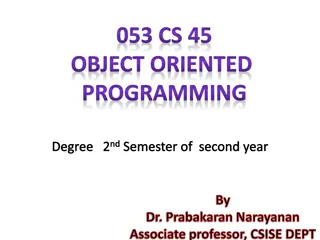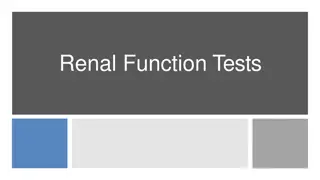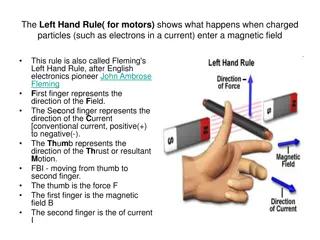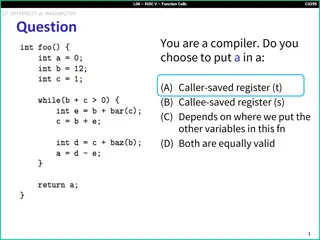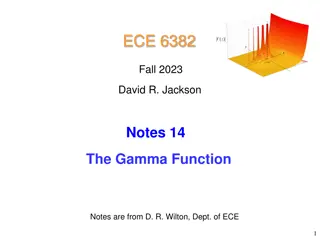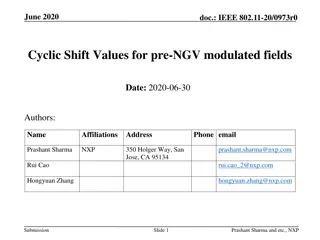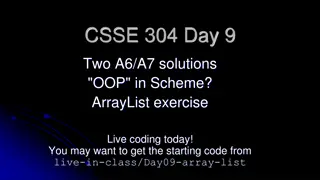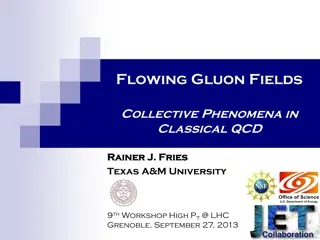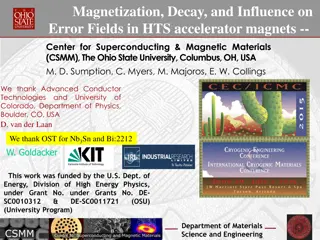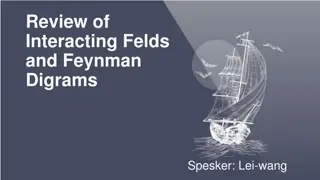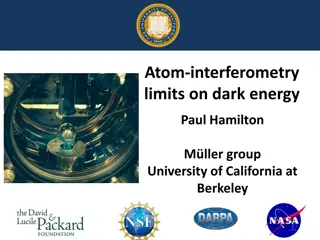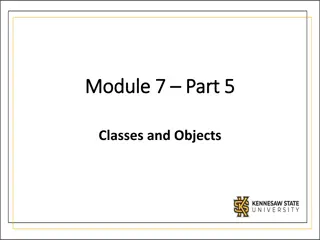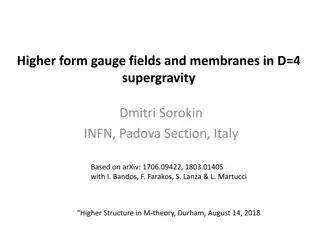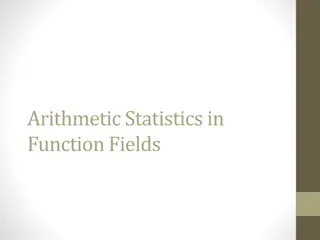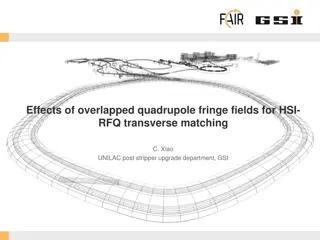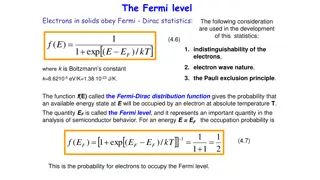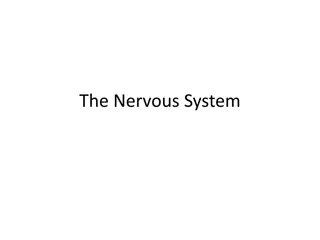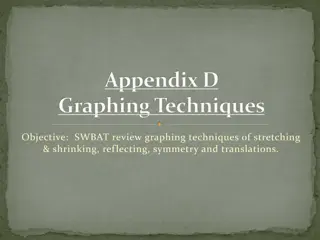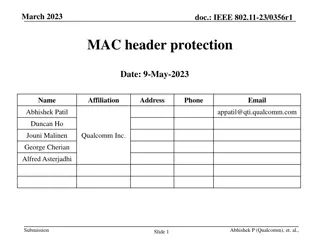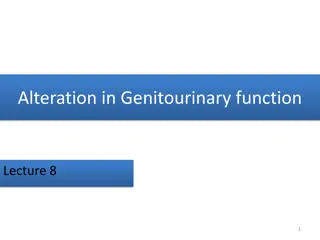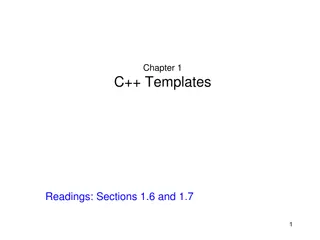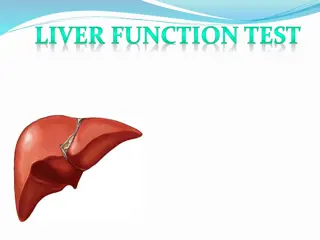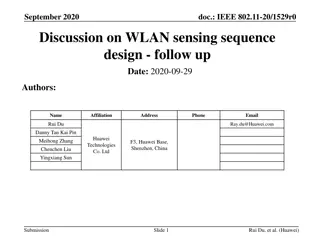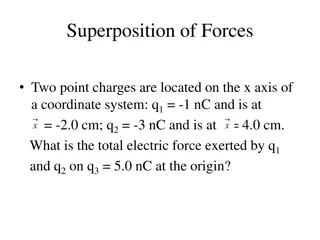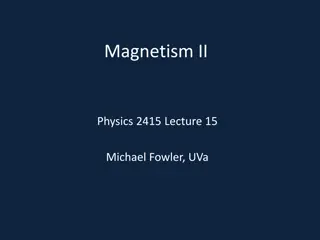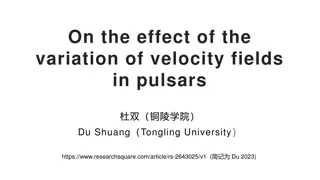Understanding Ampere's Law and Magnetic Fields in Wires
Explore the basic premise and elementary applications of Ampere's Law in calculating magnetic fields around wires. Learn how to determine the magnetic field strength at various distances from a wire carrying current, and comprehend the force between two parallel wires due to magnetic fields. Dive in
7 views • 11 slides
Basic Principles of MRI Imaging
MRI, or Magnetic Resonance Imaging, is a high-tech diagnostic imaging tool that uses magnetic fields, specific radio frequencies, and computer systems to produce cross-sectional images of the body. The components of an MRI system include the main magnet, gradient coils, radiofrequency coils, and the
2 views • 49 slides
Understanding Renal Function Tests: Lecture Insights on Kidney Function and Structure
This lecture delves into the essential aspects of renal function tests, exploring the functional units of the kidney, the role of nephrons in maintaining homeostasis, and the intricate processes of filtration, reabsorption, and secretion within the renal tubules. Key topics include the hormonal and
4 views • 17 slides
Understanding Date Fields in Contract Management Systems
Contract management systems often have specific date fields that serve different purposes. Effective Dates, Period of Performance Start Dates, and Completion Dates all have unique functions and must be accurately reported in systems like FPDS. It is crucial to understand the differences between thes
3 views • 7 slides
Exploring Magnetic Fields and Earth's Magnetism
Uncover the fascinating world of magnetic fields, from the historical discoveries of magnetism to understanding the Earth's magnetic field and its poles. Dive into the concepts of magnetic forces, field lines, and the direction of Earth's magnetic field over time. Discover the properties of magnetic
1 views • 24 slides
Understanding Function Templates and Generic Programming in C++
Dive into function templates and generic programming in C++, exploring how to create reusable code for multiple data types. Learn about generic function templates, class templates, and how to declare function templates efficiently. Enhance your understanding of type-independent patterns and how to i
1 views • 32 slides
Understanding Renal Function Tests and Kidney Health
Renal function tests are essential for diagnosing and monitoring kidney health. These tests assess functions like glomerular filtration, tubular reabsorption, and endocrine functions of the kidneys. Common indicators include serum urea, creatinine levels, and more. It's crucial to evaluate renal fun
0 views • 34 slides
Understanding Magnets and Magnetic Fields
Explore the fascinating world of magnets and magnetic materials. Discover how magnets have two poles, North and South, and how they interact with each other. Learn about magnetic materials like iron, cobalt, and nickel, and understand the concept of magnetizing and demagnetizing. Dive into the magne
0 views • 15 slides
Magnetic Field Problems: Protons, Wires, and Charged Ions
Solve various problems related to magnetic fields, including determining forces on protons, calculating magnetic forces on wires with currents, finding the radius of paths for charged ions in magnetic fields, and more. Understand concepts such as magnetic forces, circular orbits, and interactions be
0 views • 10 slides
Understanding Fleming's Left Hand Rule and Electric Motors
Fleming's Left Hand Rule, also known as the Left Hand Rule for Motors, explains the interaction between charged particles and magnetic fields. Electric motors utilize this principle to convert electrical energy into mechanical energy through the interaction of magnetic fields and current-carrying co
2 views • 6 slides
Understanding RISC-V Function Calls
In RISC-V function calls, the decision to place variables in caller-saved or callee-saved registers depends on various factors such as recursion and variable usage within the function. Additionally, understanding how function arguments are passed and stored is crucial for efficient program execution
0 views • 5 slides
Introduction to Gamma Function and Equivalent Integral Forms
The Gamma function is a versatile mathematical function that generalizes the factorial function to non-integer and complex values. It has various integral definitions such as the Euler-integral form. The proof of the factorial property of the Gamma function is demonstrated through analytical continu
1 views • 20 slides
IEEE 802.11-20/0973r0 Cyclic Shift Values for Pre-NGV Modulated Fields
Introduction to the determination of cyclic shift values for pre-NGV modulated fields in the IEEE 802.11-20/0973r0 document. The proposal suggests using existing values defined for pre-VHT, specifically for L-STF, L-LTF, L-SIG, and VHT-SIG-A fields of the PPDU. References and a straw poll are also i
2 views • 5 slides
Exploring Object-Oriented Programming in Scheme
The content discusses implementing object-oriented programming concepts in Scheme, focusing on encapsulation through fields and methods. It explores representing objects and manipulating fields exclusively through methods. The tutorial covers creating objects, defining methods, and accessing fields
2 views • 13 slides
Understanding Flowing Gluon Fields and Color Glass Phenomena in QCD
Explore the collective phenomena of gluon fields in classical QCD, focusing on the Standard Model of URHICs, Color Glass, and Gluon Fields in the Forward Lightcone. The research delves into topics like local thermal equilibrium, viscous hydrodynamics, and the interaction of probes with quarks and gl
0 views • 24 slides
Data Warehouse Student User Group Meeting Updates March 20, 2019
Updates from the Data Warehouse Student Data Users Group meeting on March 20, 2019 include repurposed course inventory fields, addition of new military-affiliated student fields, and changes in Curriculum Management system functionality. Key changes involve labeling and retirement of certain data el
1 views • 16 slides
Magnetization, Decay, and Error Fields in HTS Accelerator Magnets
The research conducted at The Ohio State University focuses on understanding the magnetization, decay, and influence of error fields in high-temperature superconducting (HTS) accelerator magnets. The study explores the impact of different superconducting materials such as Nb3Sn, YBCO, and Bi:2212 on
0 views • 21 slides
Understanding Interacting Fields and Feynman Diagrams in Quantum Field Theory
Delve into the fascinating world of quantum field theory with a focus on interacting fields and Feynman diagrams. Explore perturbation theory, correlation functions, Wick's theorem, and Feynman diagram rules to gain insights into preserving causality, calculating two-point correlation functions, and
0 views • 18 slides
Understanding Classical Mechanics and Fields in Physics
Explore the concepts of radiation, matter, fields, Hamiltonian, and more in classical mechanics with a focus on velocity-dependent potentials and conservative systems. Dive into the detailed discussions on gauge theory, Coulomb gauge, magnetic fields, and Hamiltonian operators within the framework o
0 views • 28 slides
Limits on Dark Energy Using Atom Interferometry - UC Berkeley Study
Research conducted by Paul Hamilton Müller's group at the University of California, Berkeley, focuses on using atom interferometry to explore dark energy. The study delves into screened scalar fields as dark energy, future reach with atom interferometry, known unknowns related to dark energy densit
0 views • 39 slides
Understanding Classes and Objects in Python and Java
Python and Java both utilize classes and objects in their programming paradigms. While there are syntax differences, the fundamental concepts remain similar. Fields and constructors are key components in defining classes, with Python using shared fields until assignments are made and Java focusing o
1 views • 6 slides
Higher-Form Gauge Fields and Membranes in D=4 Supergravity
This study focuses on higher-form gauge fields and membranes in D=4 supergravity, exploring their role in cosmological constant generation and membrane nucleation. The dynamics of three-form gauge fields, their coupling to gravity and membranes, and implications for cosmological models and supersymm
0 views • 17 slides
Understanding Arithmetic Statistics in Function Fields
Delve into the world of arithmetic statistics in function fields, exploring concepts like the Divisor function, Dirichlet divisor problem, counting methods, Euler summation formula, and more. Discover the beauty of number theory through the lens of these mathematical functions and distributions.
0 views • 22 slides
Investigation of Overlapped Quadrupole Fringe Fields for HSI-RFQ Transverse Matching
General introduction to the study on quadrupole fringe fields, focusing on investigating the effects of overlapped fringe fields on HSI-RFQ transverse matching by introducing a new QQ focusing system and measuring transmission efficiency with comparisons between simulations and experiments. The stud
0 views • 17 slides
Understanding Fermi-Dirac Statistics in Solids
Electrons in solids obey Fermi-Dirac statistics, governed by the Fermi-Dirac distribution function. This function describes the probability of electron occupation in available energy states, with the Fermi level representing a crucial parameter in analyzing semiconductor behavior. At different tempe
0 views • 9 slides
Understanding Electric Fields: Fundamentals and Concepts
Electric fields are created by surrounding charges and are represented by vectors indicating the force experienced by a test charge. Electric field lines help visualize the direction and strength of the field, with denser lines indicating stronger fields. The electric field due to a point charge can
0 views • 13 slides
Understanding the Nervous System: Structure and Function
The nervous system is a complex network divided into the central nervous system (CNS) and peripheral nervous system (PNS). Neuroglia, or supporting cells, play vital roles in maintaining the health and function of neurons. Neurons, the fundamental units of the nervous system, vary in structure and f
1 views • 29 slides
Overview of Graphing Techniques and Functions
Explore graphing techniques including stretching, shrinking, reflecting, symmetry, translations, and various types of functions such as the identity function, square function, cube function, square root function, cube root function, and absolute value function. Understand vertical and horizontal shi
0 views • 25 slides
Monitoring Thyroid Function After Head and Neck Cancer Treatment
This collection of images and data discusses the importance of monitoring thyroid function after head and neck cancer treatment, specifically focusing on post-treatment thyroid function tests, audits of practices in head and neck units, thyroid function post laryngectomy, and the significance of det
0 views • 11 slides
Vulnerabilities in Unprotected MAC Header Fields in IEEE 802.11 Standard
The document discusses the risks associated with unprotected fields in the MAC header of MPDUs in IEEE 802.11 standards, highlighting how these fields can be vulnerable to attacks leading to adverse effects on receivers. Fields like Frame Control, Sequence Control, and QoS Control are identified as
0 views • 10 slides
Understanding Alterations in Genitourinary Function: An Overview
The genitourinary system comprises the urinary and reproductive organs, with the kidneys, ureters, bladder, and urethra playing crucial roles. Maintaining proper function involves factors like renal blood flow, glomerular filtration, tubular function, and urine flow. Nephrons are the functional unit
0 views • 58 slides
Understanding Memory Management in Computer Systems
Dive into the intricacies of memory management with Chapter 5 by Mooly Sagiv. Explore topics such as heap allocation, limitations of stack frames, currying functions, browser events in JavaScript, static scope for function arguments, result of function calls, closures, and more. Gain insights into m
0 views • 86 slides
Understanding C++ Templates: Generic Programming and Function Templates
Exploring the concepts of C++ templates including type-independent patterns for working with various data types, generic class patterns, function templates, and their usage. The reading covers examples of function templates for finding maximum values in vectors and highlights the importance of clear
0 views • 12 slides
Understanding Liver Function Tests and Their Significance
The liver carries out essential metabolic, excretory, protective, synthetic, and storage functions in the body. Liver function tests play a crucial role in screening for liver dysfunction, recognizing patterns of liver disease, assessing patient prognosis, monitoring disease progression, and evaluat
0 views • 48 slides
Analysis of WLAN Sensing Sequence Design Using Ambiguity Function and Range-Doppler Map
In this document, the authors from Huawei discuss the analysis of employing the ambiguity function for WLAN sensing sequence design. They delve into the ambiguity function's definition, analysis, and its comparison with the range-Doppler map. The document highlights the importance of ambiguity funct
0 views • 15 slides
Function-Based Behavior Support Plans: A Comprehensive Guide
Explore the process of developing Function-Based Behavior Support Plans (BSP) using Functional Behavioral Assessment (FBA). Understand the concepts of function and functional behavior assessment, learn how FBA/BSP fits within a multi-tiered support system, and practice developing BSP for students. D
0 views • 74 slides
Electric Charges and Fields in Physics
Explore topics such as superposition of forces, electric fields, particle interactions, potential differences, and cathode-ray tube concepts in physics involving charges, forces, and fields. Understand scenarios like calculating total electric force between charges, finding electric fields at specif
0 views • 10 slides
Understanding Image-Based Rendering and Light Fields
Exploring the concepts of Image-Based Rendering (IBR) and Light Fields through a historical perspective, pros and cons analysis, basic approaches, and recent developments in the field. IBR offers photorealistic image capture and representation, with advancements like data-driven graphics and appeara
0 views • 43 slides
Understanding Magnetism: Forces, Fields, and Applications
Explore the fascinating realm of magnetism in Physics as you delve into topics such as forces on charged particles, path of particles in magnetic fields, torque on current loops, and Earth's magnetic field alignment. Learn about the force on straight wires and electric charges in magnetic fields, an
0 views • 14 slides
Impact of Velocity Field Variations on Pulsar Magnetic Fields
The study explores how variations in velocity fields affect pulsar magnetic fields, highlighting the conversion of kinetic energy to magnetic energy in pulsars. Glitches in these systems can lead to changes in magnetic fields, influencing pulsar emissions. The maintenance of stable magnetic fields a
0 views • 14 slides





